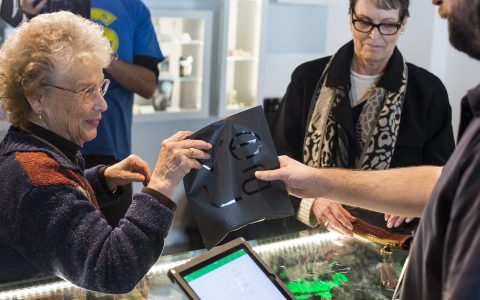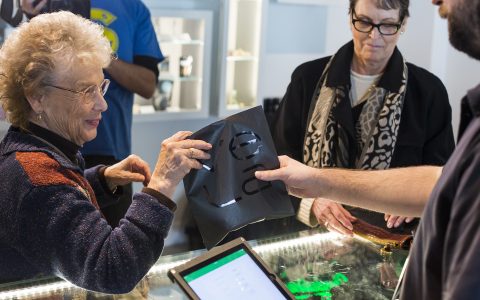It’s pretty common knowledge that seniors are the fastest-growing group of new cannabis consumers in the US.
One of the biggest surprises in the study: 54% of cannabis-consuming seniors used the product both medically and recreationally.
But a new study that looked at marijuana consumers across Colorado suggests a growing number of Americans aged 60 and older are using cannabis regularly both for medical and recreational purposes. Among those in the study who say they use it medicinally, the majority appear to be self-medicating.
You might be tempted to say, “well that’s just Colorado.” But the new research is expected to have national implications as cannabis legalization continues to expand across the nation.
It also shows the educational and cultural hole that many doctors and healthcare professionals find themselves in, when they try to discuss the potential risks and benefits of cannabis use with their patients.
274 Seniors, Around 72 Years Old
The study, published in the journal The Gerontologist, was funded by the Colorado Department of Public Health and Environment. It was led by researchers from the University of Colorado, along with collaborators from the University of Iowa and the University of Illinois at Urbana-Champaign.
Dr. Hillary Lum, assistant professor of medicine at the University of Colorado School of Medicine, is one of the study’s co-authors.
She told Leafly the researchers worked hard to make the study as geographically diverse as possible, pulling in responses from seniors all over Colorado.
Lum’s team recruited people not only from community-based settings, like senior centers or communal meal programs, but also by posting flyers at cannabies dispensaries across the state.
That led to 274 respondents, 65% of whom were women, between the ages of 60 and 94 (the median age was 72.5).
45% Enjoyed the Product in the Past Year
Of those respondents, 45% reported using cannabis during the past year. Smoking cannabis flower was a common consumption method, but Lum said that “often smoking was in addition to using another preparation, such as edibles or topical creams, vaporizing or liquid.”
One of the biggest surprises in the study, according to Lum, was that 54% of cannabis-consuming seniors said they used the product both medically and recreationally.
“From a physician’s perspective it’s very easy for us to think that it’s black or white, one or the other, people are either just using for medical reasons or just using recreational,” she said. “So it’s an important takeaway for clinicians to ask about all reasons for use.”
Most Common Conditions
The study also found that, of the seniors who used cannabis medicinally, a majority said they used it for a variety of conditions.
The most common reason was to treat arthritis and back pain, followed by anxiety and depression.
The most common reason was to treat arthritis and back pain, followed by anxiety and depression.
And those past-year cannabis consumers, according to Dr. Lum, said their lives were improved by their cannabis consumption.
“They really felt that it was helping a lot of things,” she added. “It helped their overall health and well-being, their quality of life, their day-to-day functioning and their pain. It really seems to be something that those who choose to use it appreciate it.”
About 40% of respondents reported no change in their day-to-day functions when using marijuana. But surprisingly around 22% of respondents reported “some problems” with memory loss when they used cannabis.
The fact that some of the seniors surveyed self-reported memory loss is “notable,” said Lum; and led to speculation that they might be pretty mentally sharp to begin with for their demographic.
Stigma and a Lack of Educated Doctors
Dr. Lum believes that, as more states legalize the adult use of cannabis, their older adult populations may quickly approach Colorado’s when it comes to the everyday use of marijuana – especially as more delivery methods, from smoking to vaping to tinctures and edibles, become available.
The study, she added, also suggests that many seniors are buying at adult-use stores rather than getting a Colorado medical marijuana card, even though medical cannabis is usually less expensive due to its lower tax rate.
Dr. Hillary Lum, University of Colorado study co-author
That decision to purchase without a medical cannabis card, even when they’re using it medically, could indicate the difficulty seniors and people in general face when they approach doctors and other healthcare providers for information about marijuana’s medical benefits and risks.
“From my experience, we don’t, as clinicians in general, have as much knowledge about the potential therapeutic benefits of marijuana, as well as the side effects,” Lum said.
Lum hopes this new study “can help highlight the opportunities for more patient/clinician discussions in the healthcare setting” regarding cannabis use.
She pointed to ongoing research on cannabis and cannabinoids by the National Institutes of Health as a positive sign. But Lum said the medical community needs more information on cannabis so it can properly advise its patients.
“I think about how my training hasn’t included enough about how I can counsel individuals on the risks and benefits,” she continued, “including what’s involved in getting a [medical marijuana] red card or where appropriate dispensaries would be to ensure consistent dosing.”
Lum’s advice to older patients considering cannabis is to bring up the subject with their doctors and to be strong advocates for their own health.













